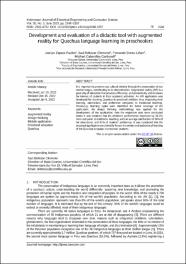Development and evaluation of a didactic tool with augmented reality for Quechua language learning in preschoolers

View/
Download
(application/pdf: 929.2Kb)
(application/pdf: 929.2Kb)
Date
2023-01-09Author(s)
Zapata-Paulini, Joselyn
Beltozar-Clemente, Saul
Sierra-Liñan, Fernando
Cabanillas-Carbonell, Michael
Metadata
Show full item recordAbstract
“It is important to preserve our cultural identity through the preservation of our
mother tongue, contributing to its dissemination. Augmented reality (AR) is a
great ally of education that provides efficiency, and productivity and increases
the interest of students in their academic activities. An AR application was
developed for learning Quechua in preschool children, thus improving their
learning, satisfaction, and preference compared to traditional teaching.
Previously, learning styles were identified for better coverage of the
application; the design thinking methodology was applied for the
development of the application, then the respective tests were conducted
where it was obtained that the children's performance improved by 28.3%
more compared to traditional teaching, with an average satisfaction of 89% of
the classrooms, and 81% of students' preference. It was concluded that the
proposed application considerably favors the written and audiovisual learning
of the Quechua language in preschool students.
“
Collections
- SCOPUS [380]

